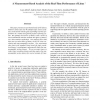Free Online Productivity Tools
i2Speak
i2Symbol
i2OCR
iTex2Img
iWeb2Print
iWeb2Shot
i2Type
iPdf2Split
iPdf2Merge
i2Bopomofo
i2Arabic
i2Style
i2Image
i2PDF
iLatex2Rtf
Sci2ools
104
click to vote
RTAS
2002
IEEE
2002
IEEE
A Measurement-Based Analysis of the Real-Time Performance of Linux
This paper presents an experimental study of the latency behavior of the Linux OS. We identify major sources of latency in the kernel with the goal of providing real-time performance in a widely used general-purpose operating system. We quantify each source of latency with a series of micro-benchmarks and also evaluate the effects of latency on a time-sensitive application. Our analysis shows that there are two main causes of latency in the OS: timer resolution and non-preemptable sections. Our experiments show that in the standard Linux kernel the timer resolution latency is predominant, and generally hides the nonpreemptable section latency. We use accurate timers to reduce timer resolution latency and then analyze the nonpreemptable section latency for several variants of Linux.
Embedded Systems | Latency Behavior | Nonpreemptable Section Latency | RTAS 2002 | Timer Resolution Latency |
| Added | 15 Jul 2010 |
| Updated | 15 Jul 2010 |
| Type | Conference |
| Year | 2002 |
| Where | RTAS |
| Authors | Luca Abeni, Ashvin Goel, Charles Krasic, Jim Snow, Jonathan Walpole |
Comments (0)

